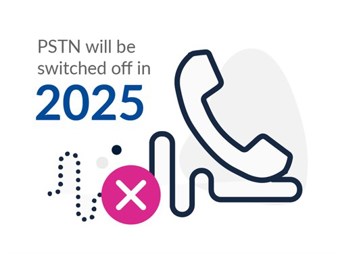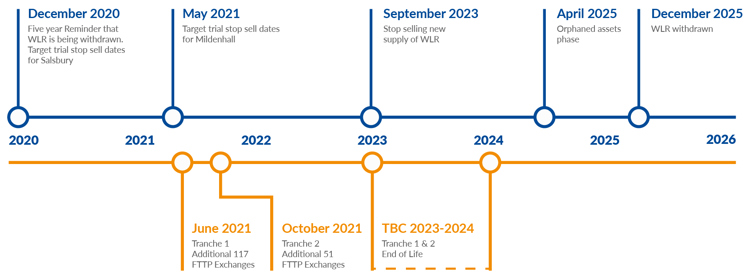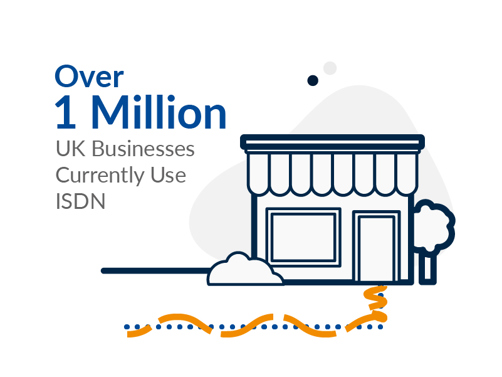Things to Consider when Choosing Internet and Connectivity Solutions
Fibre Fit for the Future
Grant Thain, Vendor Manager and Connectivity Expert at Chess, summarises what the 2025 PSTN switch-off means to businesses and what the alternative options are:
I once had a conversation with a colleague in our Marketing team that went along the lines of “but Grant connectivity is really boring… nothing new ever happens”. Now you could argue she had a fair point a few years back. But with the seismic change in the way calls and data are going to be delivered over the next four years, even she may concede it is becoming mildly interesting.
In December 2025, the UK Public Switched Telephone Network (PSTN) will be switched off. The PSTN is the core network infrastructure owned and managed by Openreach. It is used to deliver a range of voice and data services, including telephone lines, ISDN lines, and certain broadband services such as ADSL and FTTC.
There are some key things that I think you should be considering:
- You are likely to be impacted sooner than you think. 2025 may be 4 ½ years away, but the National copper stop-sell is in September 2023. If you are in a Priority Exchange area, you could be impacted as soon as June 2021.
- Understand what services you have that are impacted. This is key to plan your migration.
- Determine your voice strategy. If you use PSTN-based services for voice calls, you will need to change.
- Engage with your Special Service providers. Start asking them about their plans for PSTN switch-off compliant services.
- Identify the opportunity - the PSTN switch-off allows you to rationalise and upgrade your current services. Remember, you may end up reducing your costs in the long term.

The decision to switch off the PSTN is based on many factors - the age of the equipment, the challenges around supporting the network, lack of available spares and engineers trained on the equipment.
The switch-off means that all the services currently delivered using PSTN will need to be migrated to alternative products before December 2025. These alternative products fall into two categories:
- All-Internet Protocol (All-IP)
- Metallic Path Facility (MPF)
Openreach will stop allowing the sale of new PSTN based products from September 2023. That means that around 16 million services will need to be migrated before December 2025.
To provide one of the alternative products needed to replace the PSTN based services, Openreach is carrying out a huge infrastructure program of delivering fibre connectivity. Unlike the current copper-based network, the fibre will continue into the customer premises. Fibre to the Premises (FTTP) is currently available in around 4.6 million premises. Openreach aims to have up to 25 million premises passed by the mid/end of the decade.
The FTTP rollout allows Openreach to transition to alternative products earlier. When FTTP gets to 75% availability within a certain area, Openreach can designate that exchange as a Priority Exchange. At that point, a 12-month notice is given to stop the sale of copper-based products at premises where FTTP is available. If you want a new service or you want to switch suppliers, you will only be able to buy FTTP irrespective of whether you would prefer another service.
Openreach has been rolling out the FTTP Priority Exchange program in tranches, with a new tranche being announced every three months. Currently, there are four tranches, totalling 220 exchanges, which have been designated Priority. The first stop sell of copper-based products happens for 13 of those Priority exchanges in June 2021, with further stop sells in October, January, and April.

In summary, there are two timelines to consider:
National PSTN Closure
- Impacts every exchange in UK
- Stop Sell of PSTN based products in September 2023
- PSTN based products need to be migrated to alternative products by December 2025
FTTP Priority Exchange Rollout
- Impacts individual exchanges
- 12 months’ notice of copper-based product stop sell when 75% FTTP availability
- Impacts customers from June 2021

So, what are the alternative products? Earlier, I said they fall into two categories: All-Internet Protocol (All-IP) and Metallic Path Facility (MPF).
All-IP
All-IP are a range of new products which are designed to deliver data only services. By this, I mean that they do not have a native ability to pass voice calls. PSTN based services such as ISDN and Analogue Lines are primarily voice services, with an option to overlay a data service such as ADSL/FTTC over the top. All-IP products are a data-only service, and if you want to make calls, you will need to purchase an over-the-top Voice over IP product (VoIP). If you wish to retain your telephone number, you will need to port it to the VoIP supplier.
There is a range of All-IP products either currently available or in development. FTTP uses the new fibre infrastructure to deliver high speed, super reliable services and will become the standard service as availability increases. For locations where FTTP is unavailable, products such as SOGFAST, SOGEA and SOTAP (we do love an initialisation in telecoms) use existing copper infrastructure to deliver data only services. These are effectively data only versions of GFAST, FTTC and ADSL (their old-world counterparts).
If you use your current PSTN based service to make calls and want to continue to do so following migration to an All-IP product, then you will need to purchase an over-the-top VoIP service. Different options are available based on what your voice requirements are. If you have an existing phone system you want to retain, SIP would be ideal for you. If you have less complicated voice requirements, then there are single voice line options designed to replace the old school analogue line. If you are a larger business, a feature-rich cloud voice system would be preferable.

Is your phone system holding you back or helping you fly?
Read this guide to understand how your phone system may be damaging your profitability and the benefits Cloud Communications can offer you.
MPF
MPF is a established technology, which came out of the deregulation or Local Loop Unbundling (LLU) of UK Telecommunications. LLU allows multiple telecommunications operators to use connections from the same local exchange. The switch-off of the PSTN does not impact MPF services, as effectively, the MPF operator uses their network to connect exchanges rather than the PSTN. MPF services include Analogue Lines, ADSL and FTTC and have a native voice service included, so work with existing analogue handsets/wiring. This removes a requirement to purchase an over-the-top VoIP product. However, MPF is not a competitor to FTTP. FTTP offers faster speeds, less impact from environmental conditions and is more reliable than copper-based products. MPF is an alternative to SOGEA/SOTAP, in locations where FTTP is not available.
At this point, it is worth mentioning special services such as alarm lines, lift lines and medical pendants. Many special services use analogue based lines to function. There is no direct analogue replacement product available, and as such, there is no guarantee that those special services will work with an All-IP product. The onus is on the special service provider (e.g., Alarm company, lift supplier, etc.) to offer alternative options, which are All-IP compliant. There is a lot of industry engagement with special services sectors. However, there is a mixed picture of how 2025 ready those sectors are. We strongly suggest that you should engage with your special service supplier at the earliest opportunity to start the conversation about how you protect yourself moving forward.
Unsure of where to start with your PSTN 2025 strategy? Chess has a full range of PSTN switch off compliant services, and our consultative approach can guide you through determining the solution, which is best for you. Contact one of your experts for advice today.
Speak to a Specialist
You can fill out the form and one of our product specialists will contact you shortly with more information.



About the author
uSkinned
uSkinned, the world’s number one provider of Umbraco CMS themes and starter kits.